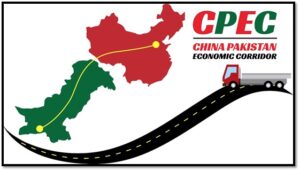
By Amjad Mehmood
China Pakistan Economic Corridor (CPEC) is mainly attributed as a game-changer for Pakistan. The governments in past led by Pakistan Peoples Party (PPP) and Pakistan Muslim League-Nawaz (PML-N) take the credit to launch this mega project in Pakistan despite the United States of America’s (USA) opposition and Indian subterfuges for giving a strategic importance to China in Pakistan. The incumbent government of Pakistan Tehrek-e-Insaf (PTI) has also publicly admitted prominence of the CPEC for which the party leaders were not very benevolent in the past.
Pakistani government initially assigned the responsibilities to Ministry of Planning, Development and Special Initiatives to deal with the CPEC projects. Later in October, 2019, through a presidential ordinance a CPEC authority was established focusing to speed up the pace of CPEC related activities and to tap further opportunities for growth through regional and global connectivity. The opposition parties have criticized the formation of authority and opined that it would create problems and complications in collaboration between the ministries and departments. Amid the criticism, Govt has appointed
Lt. Gen (Retd) Asim Saleem Bajwa as first Chairman of CPEC authority for the period of four years. Apparently, this effort was made to assure the Chinese government that Pakistan is serious and committed to complete the ongoing CPEC projects. The appointment of a former military general was also an attempt to ensure the China that Pakistani civil-military leadership is concerned to complete all CPEC related projects and to diffuse the impression of rolling back the CPEC in Pakistan which was surfaced through news coverage in national and international media.
 Pakistan’s official statement on China-Pakistan Economic Corridor is depicted on the website exclusively developed to upload the progress on CPEC. It says, “CPEC will not only benefit China and Pakistan but will have positive impact on Iran, Afghanistan, India, Central Asian Republic, and the region. The enhancement of geographical linkages having improved road, rail, and air transportation system with frequent and free exchanges of growth and people-to-people contact, enhancing understanding through academic, cultural, and regional knowledge and culture, activity of higher volume of flow of trade and businesses, producing and moving energy to have more optimal businesses and enhancement of co-operation by win-win model will result in well connected, integrated region of shared destiny, harmony and development.”
Pakistan’s official statement on China-Pakistan Economic Corridor is depicted on the website exclusively developed to upload the progress on CPEC. It says, “CPEC will not only benefit China and Pakistan but will have positive impact on Iran, Afghanistan, India, Central Asian Republic, and the region. The enhancement of geographical linkages having improved road, rail, and air transportation system with frequent and free exchanges of growth and people-to-people contact, enhancing understanding through academic, cultural, and regional knowledge and culture, activity of higher volume of flow of trade and businesses, producing and moving energy to have more optimal businesses and enhancement of co-operation by win-win model will result in well connected, integrated region of shared destiny, harmony and development.”
China Pakistan Economic Corridor includes multiple projects related to energy, infrastructure development such as countrywide motorways, rail lines, establishment of Special Economic Zones (SEZs), social sector development projects and the mega project of development of Gwadar port. The project was launched on April 20, 2015 when Chinese President Xi Jinping and by the then Pakistani Prime Minister Nawaz Sharif signed 51 agreements and Memorandums of Understanding valued at US$46 billion. CPEC is part of the larger Belt and Road Initiative to improve connectivity, trade, communication, and cooperation amongst the countries of Eurasia as announced by China in 2013.
Since 2015, several energy projects including Sahiwal 2x660MW Coal-fired Power Plant in Punjab, 2×660MW Coal-fired Power Plants at Port Qasim in Karachi, HUBCO Coal Power Project in Hub Balochistan, Hydro China Dawood Wind Farm Gharo in Thatta and many others are either fully or partially operational. Similarly, several road infrastructural projects such as KKH Phase II (Thakot -Havelian Section), Peshawar-Karachi Motorway (Multan-Sukkur Section), Gwadar East-Bay Expressway, Orange Line – Lahore, and Western Route Projects are also fully or partially completed. The multiple projects feasibility and development work including New Gwadar International Airport, Pak China Friendship Hospital, Pak-China Technical and Vocational Institute at Gwadar is under process. Few other important projects including Karachi Circular Railway, Greater Peshawar Region Mass Transit, Quetta Mass Transit, Cross Border Optical Fiber Cable and Pilot Project of Digital Terrestrial Multimedia Broadcast (DTMB) are also part of CPEC. Development of Special Economic Zones (SEZs) on Eastern and Western routes, uplift of social, academic, and cultural sectors are also part of agreements made between China and Pakistan under the title of CPEC. So far CPEC is collection of projects worth estimated US$60 billion to connect China to Gwadar Port on the Arabian Sea. Undoubtedly, this mega infrastructural development in Pakistan is remarkable as in the past development sector was the least priority of the governments and progress remained at a snail’s pace.
The Chinese officials have time and again announced at international platforms that they highly value developing relations with Pakistan and always prioritizes China-Pakistan relations in its foreign policy. To extend the friendly ties to the next level, China welcomed Pakistan to join the Shanghai Cooperation Organization SCO and offered to keep close cooperation with Pakistan under the SCO framework. China also firmly supports Pakistan’s efforts in safeguarding national security and vowed to continue the help for Pakistan to enhance relevant capacity building.
For instance, we believe that China is investing this huge in Pakistan as an extension of the Belt and Road Initiative for the sake of its commercial interest or under China’s strategy for laying a debt trap for borrowing governments. There are many independent analysts who are in support of this argument but there are many other factors to count for a win-win situation in Pakistan.
Pakistan being a developing country highly depends on monetary support from IMF and World Bank. The countries like China, Saudi Arabia and UAE being friends also support the Pakistani governments in need time. The IMF, World Bank, and other finical giants lend the money to Pakistan on very stringent terms which cause huge inflation and currency devaluation in Pakistan. All such lending brings an influx of dearness and increases the prices index of edibles and commodities. Resultantly, every passing year, the poverty index shows an upward trend in Pakistan. The country like Pakistan where such stories of financial slavery are common, then becoming part of a CPEC like mega project with a tested friend is not a bad deal. The utter reality is irrefutable that all physical infrastructural development is happening on Pakistani territory. The incumbent government can take advantage of these projects for economic growth and poverty alleviation through strategic planning in a patriotic manner.
The global politics on CPEC, American’s influence, anti-campaigns from India, and likely-minded countries are obvious. Both the countries, China and Pakistan are required to remain focus on their set targets leaving aside the outsiders’ aggresses. So far China has sown very mature approach and consistent attitude towards the progress of CPEC despite recent odds however, unfortunately, the current Pakistani government has lowered the pace of development compared to previous years. China has first time appointed its diplomat in Pakistan having an enriched political career, Mr. Nong Rong to cater the CPEC in a proactive manner and to maintain the equilibrium between both governments. The Pakistani civil-military leadership must have assessed that CPEC completion is the only option of triumph and cannot be reverted for a smaller or timely gain under any influence. Lt. Gen (Retd) Asil Saleem Bajwa has resigned recently as CPEC authority Chairman, and he is replaced by Mr. Khalid Mansoor as new chief of the authority vide a Prime Minister’s Office notification. Mr. Mansoor is a chemical engineer by profession and possesses over 3 decades-long experience of working in the energy and petrochemical sectors. The government tied high hopes from his appointment to boost the pace of CPEC projects in the coming future.
A careful review of the whole scenario brings us to a question that ‘can Pakistan ensure completion’ of CPEC? Obviously, the power elites can answer this question but the commitment and everyday progress on this mega project is the most appropriate answer to all fragile minds.






